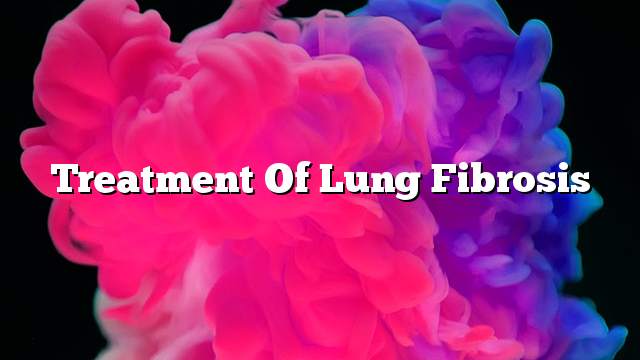Lung fibrosis
Pulmonary fibrosis is defined as a pulmonary disease that occurs when the lung tissue is damaged. The lung tissue becomes thick and rigid, causing the lung to be unable to function well. Thus, the patient suffers from difficulty in breathing. Although there is some The causes and causes of fibrosis occur; however, most cases are difficult for doctors to determine the cause; then called idiopathic pulmonary fibrosis (Idiopathic pulmonary fibrosis).
Treatment of lung fibrosis
The treatment of lung fibrosis aims to slow down the rate of deterioration of the disease and relieve the symptoms and signs that the patient complains. However, the treatment can not stop the development of the disease or remove the scar or abnormal tissue that is formed. In fact there are many therapeutic procedures that the doctor can take. Determining the optimal treatment method based on the patient’s condition.
- Medications: One of the drugs that doctors dispense for the treatment of uninfected pulmonary fibrosis is Pirfenidone, Nintedanib, and Pervenidone side effects of diarrhea, rashes and nausea. Side effects of Nantidanep are diarrhea and nausea. Many people with lung fibrosis have gastroesophageal reflux, which requires the release of antacids.
- Oxygen Therapy: Oxygen is given during sleep, exercise, or all the time. In fact, oxygen can not stop lung tissue damage, but its importance lies in the following:
- Facilitate breathing and exercise.
- Reduce blood pressure in the right part of the heart.
- Improve sleep and overall health.
- Prevent or at least alleviate the complications that may occur as a result of lack of oxygen level.
- Pulmonary rehabilitation (Pulmonary rehabilitation): Pulmonary rehabilitation aims at treating symptoms and improving daily activities in general. The pulmonary rehabilitation program focuses on:
- Physical activity for lifting endurance.
- Breathing method to improve the effectiveness of the lungs.
- Appropriate nutrition.
- Support and guidance.
- Explain the health situation and educate the injured as necessary.
- Lung transplant: Lung transplantation may be appropriate for some patients and is not appropriate for each other. Although lung transplantation improves the nature of life, however, it may lead to complications such as infection or rejection of lung transplantation. Discuss the doctor to do the right thing.
- Lifestyle and home remedies: Maintaining a healthy and healthy body by following a healthy lifestyle is essential to treat lung fibrosis and to adapt to the disease. The following recommendations are recommended by specialists:
- Quit Smoking: It is recommended that people with lung fibrosis quit smoking and avoid sitting with smokers. It is worth mentioning that there are many programs that help to quit smoking, so the doctor can discuss the matter and work with his advice.
- Taking care of food: Lungs lose weight inadvertently because of the difficulty of eating under their health conditions, in addition to the amount of energy in breathing, and therefore advised people with lung fibrosis to follow a healthy diet containing adequate amounts of calories, taking care to distribute These calories are on multiple small meals during the day, and you must be careful to stay away from high-fat foods, especially saturated fats, salty foods, and foods high in sugar, taking into account eating vegetables, fruits, whole grains, Or low fat.
- Exercise and exercise: Regular exercise keeps your lungs healthy and relieves stress, but you should consult your doctor about the type of exercise you can do depending on your health and condition.
- Take enough rest: Taking enough rest helps relieve stress and take the energy needed.
- Taking appropriate vaccinations: Infection increases the risk of lung fibrosis and makes the disease worse. The patient and his / her family should take Pneumonia Vaccine and Annual Flu Vaccine, avoiding congested areas in the classroom. flu.
Symptoms of lung fibrosis
Symptoms of lung fibrosis vary from patient to patient, and symptoms vary in severity and development among patients. Symptoms may be mild or moderate in severity and may be very severe. Symptoms may develop within a few days, months, or years. Symptoms of lung fibrosis include:
- Shortness of breath especially during exercise.
- Dry intermittent cough.
- Breathing fast and shallow.
- Intentional decrease of weight gradually.
- Fatigue and general fatigue.
- Joint and muscle pain.
- Nail clubbing.
Causes of lung fibrosis
There are some factors that increase the risk of lung injury, including the following:
- Cigarette smoking.
- Some viral infections (Viral Infection).
- Some medicines and medical treatments.
- Genetics. Most people with lung fibrosis often have another member of their family who is also cirrhosis.
- Exposure to environmental pollutants such as gases, silica, solid metal dust, bacteria, etc.
- Gastroesophageal reflux disease. People with gastroesophageal reflux disease have throat pain, and during this process the patient may breathe some acids and reach the lungs to damage them.
